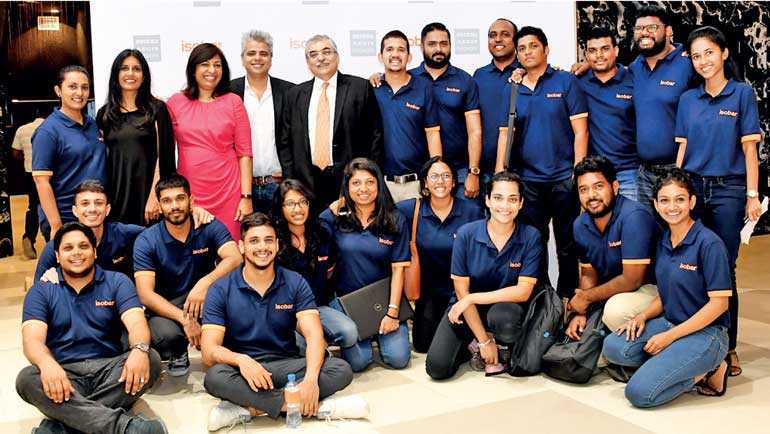Monday Feb 23, 2026
Monday Feb 23, 2026
Thursday, 15 November 2018 00:10 - - {{hitsCtrl.values.hits}}

Team Isobar Sri Lanka
Dentsu Grant Group disrupted the country’s ad industry last year with the introduction of the globally renowned Dentsu Aegis Network, and will disrupt the industry once again as they reinvent Sri Lanka’s rapidly growing digital economy with the launch of their newest full- service digital agency - Isobar. Isobar is one of the world’s largest award winning digital agency networks, with over 6,500 people worldwide represented in 85 locations in 45 countries, bringing with them incredible expertise and industry leaders in the field of digital transformation.
They have a glittering list of global clients that include Coca-Cola, adidas, Enterprise, P&G, Philips and Huawei, to name a few.
“We are thrilled to be introducing such an iconic brand into the Sri Lankan advertising industry,” states Dentsu Grant and Dentsu Aegis Network Sri Lanka Chairperson Neela Marikkar. “We are fortunate to be working so closely with our global and regional offices; we are confident that we will be able to use their global knowledge and skills to help develop business opportunities for our clients as well as help the digital economy of the country and accelerate through Isobar’s experience led transformation and brand commerce expertise.”
At Isobar, the agency mission is to transform businesses, brands and people’s lives with the creative use of digital. Isobar delivers digital transformation, solving complex business challenges through their bespoke marketing, ecosystems and products offerings and services.
Commenting on the prospects of Isobar in Sri Lanka, Isobar South Asia Group Managing Director Shamsuddin Jasani said: “I am very excited to launch Isobar in this amazing country. Sri Lanka is a rising mobile economy with smartphone penetration growing by over 20% and mobile penetration growing over 120% year-on-year. With the launch of Isobar Sri Lanka, we are looking at creating a leading agency for the digital age that follows a true full service model. Under the guidance of Neela and her team, I am sure we will be a force to reckon with in this market in the years to come.”
Furthermore, Isobar is investing in the future; this is an agency network looking beyond the current available online platforms and technologies.
They have started creating and developing new technologies and products through an initiative called NowLab. NowLab is an accelerator start-up that fosters a culture of innovation.
It is the agency space to make, experiment, prototype and workshop innovative business solutions in 14 locations across America, Europe and Asia, as well as a virtual community that connects our global teams.
The agency also launched a collaborative lab space in Mumbai to test and execute avant-garde ideas using AI, VR, IoT and wearables. By investing in emerging technologies, Isobar is keen to be a lead player in the era of technology-fuelled marketing disruption.
“The idea that NowLab is also accessible to us from our regional office in India is more than exciting, it is a real opportunity for our staff and clients to develop products and services that go beyond an agency’s scope of work, we have a real chance to impact our client’s business first hand,” adds Marikkar.
Sri Lanka is a rising mobile economy, with smartphone penetration growth rising by over 20% a year and over 120% mobile penetration.
The industry is ripe for disruption and mobile brand commerce and product innovations. Isobar Sri Lanka will also look at experimenting in the world of intangible commerce through artificial intelligence (AI), virtual reality (VR), the internet of things (IOT) and wearables.
Isobar is a highly awarded network, and in 2017 won over 300 awards, this year the agency picked up Digital Network of the Year for the fifth time in six years at Campaign Asia-Pacific›s Agency of the Year awards.
“This exceptional network is going to help us in our mission to reinvent the approach to digital advertising in Sri Lanka, we want to challenge the current practices and behaviours,” states Marikkar, “this is just the beginning.”